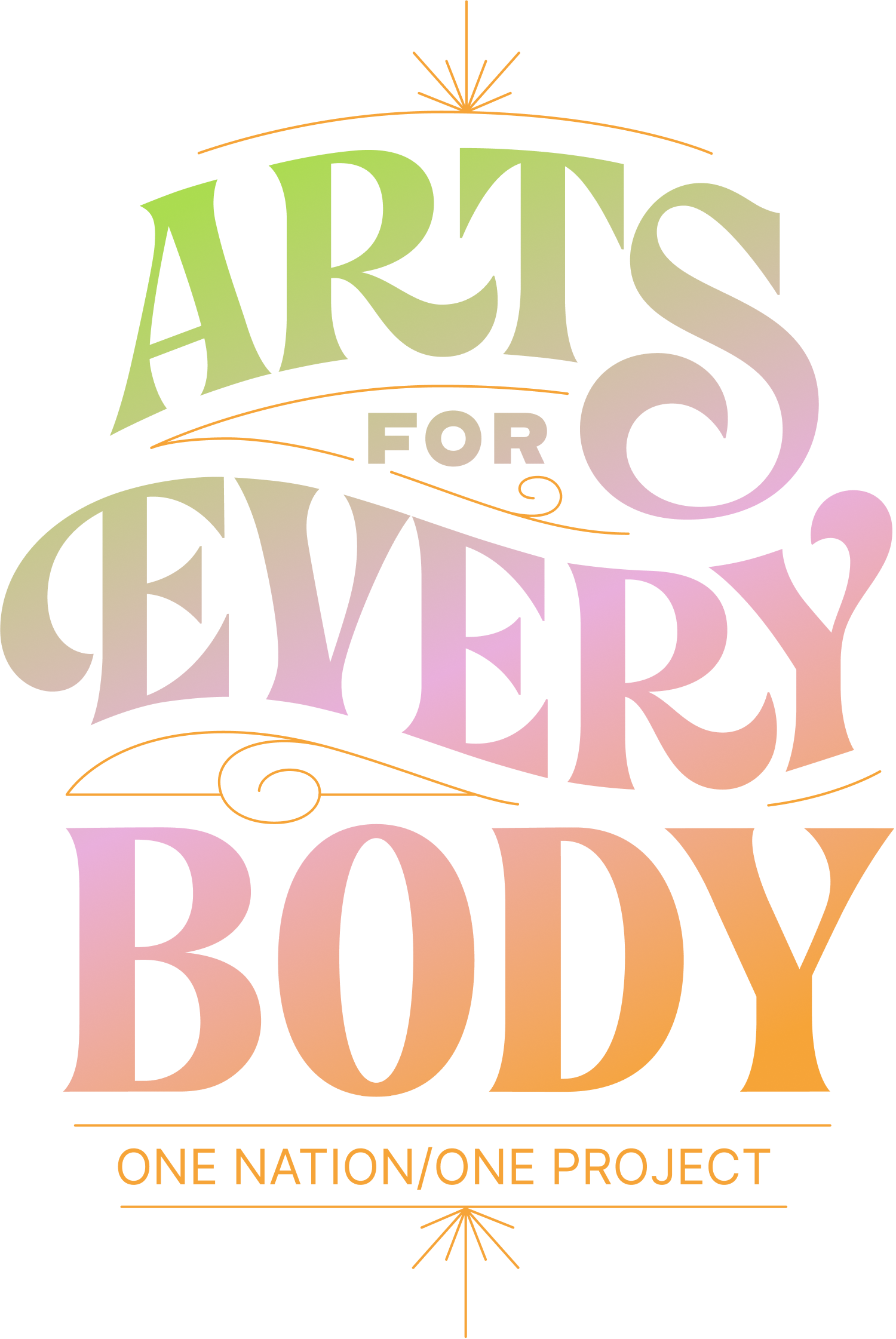How Can Arts Participation in Communities Impact Social Cohesion and Wellbeing?
One Nation/One Project ARTS FOR EVERYBODY Seeks to Answer this Question with First of its Kind National Research Study
New York City, NY — Arts for EveryBody, a national campaign out of One Nation/One Project, announces a groundbreaking new national research study to answer the question, “how can arts participation influence social cohesion and wellbeing in communities?”
The three-part, two-year mixed-methods research study is led by Dr. Jill Sonke, an award-winning researcher, leading advocate for the integration of arts and health and a founding director of the Center for Arts in Medicine at the University of Florida. The research seeks to examine and achieve the following:
Establish a new definition of “arts participation” for public health research
Explore relationships between arts participation, social cohesion and wellbeing through surveys, focus groups and participatory murals
Explore the feasibility, acceptability and structures of “social prescribing” – wherein people are connected to local non-clinical resources, including arts and culture, to support their health– by creating three case studies of pilot projects
The ONOP Arts for EveryBody research study is one component in this important national initiative. On July 27, 18 small towns and big cities will put a spotlight on the health benefits of arts participation by premiering an array of large-scale, community-specific participatory art projects, inviting all to dance, sing, draw, create and more - together - spurring joy and social connection.
“This research is meant to holistically examine the known health benefits of experiencing and participating in art of every form – to capture and quantify the benefits of art much like we look at the value of exercise for good health,” said Sonke. “This multi-faceted research will lay the foundation for robust public health practices, research methodologies, and policy formulations aimed at harnessing the transformative power of the arts.”
Arts Participation Definition
Today, ONOP Arts for EveryBody Research and Impact team released results from the first published phase of its work - an arts participation definition for the purpose of public health research - in a new research brief. The newly formulated definition identifies both modes of engagement and includes various art forms intending to frame the arts broadly and inclusively.
Arts participation includes different MODES, or ways, in which people engage in the arts, including informal, formal, live, virtual, individual and group participation.
Arts participation also includes different art FORMS or disciplines with which people engage, including countless variations of dance/movement, literary arts, media, music, theater/performance, visual arts, craft and design, and more.
This new definition can be used by researchers and people offering arts programming they wish to evaluate. It can be used to develop survey questions and instruments, evaluations and studies that measure the benefits of the arts to individual and public health. It can also be used to advance policy and funding for arts programs that support health.The full research brief is available at artsforeverybody.org/research.
Exploring the Relationships Between Arts Participation, Social Cohesion and Wellbeing
This study will curate perspectives from the 18 Arts for EveryBody cities and towns across the country, through surveys, focus groups and participatory murals. Through this process, ONOP is also committed to advancing equity in research practices, which is why this study has been co-created and the data and results will be owned by each participating community. The data is designed to help each community advocate for local investments in arts and health programming.
In addition, a national survey - using a novel artified and gamified new survey web application - launched to help determine the public’s perceptions of the relationships between arts participation, social cohesion and wellbeing, as well as their desire to participate in the arts to enhance their own wellbeing. Early, realtime data (as of March 6) shows that approximately 96% of people surveyed want to participate in the arts to improve their wellbeing. To take the survey, go to onopsurvey.arts.ufl.edu/ap.
“We are eager to empower communities with local data that can help them advocate for more investment in, and access to, the arts to enhance residents’ health and wellbeing,” said Sonke. “We believe that both local and national research results will help make the case that like weekly exercise, participating in the arts is good for your health. Our goal is to introduce this important concept to the American people, and have decision-makers and funders recognize the power of the arts for social cohesion and health.”
Social Prescribing Case Studies
Imagine a scenario in which a health care provider prescribes taking a dance class or joining a local choir to improve a patient’s health and wellbeing. This approach is being explored in three Arts for EveryBody communities - the Bronx, New York; Gainesville, Florida; and Harlan County, Kentucky. The ONOP Arts for EveryBody Research and Impact team is studying these efforts through case studies and implementation science studies designed to assess the feasibility of the approach and to share these innovative practice models.
Why it matters?
“As a nation, too many live with chronic mental and physical health challenges and disparities. It’s time to ignite a national dialogue around the importance of the arts in healing our communities,” said Lear deBessonet, co-artistic director for Arts for EveryBody and Tony-nominated director, artistic director of Encores! at New York City Center and the Founder of Public Works.
About One Nation/One Project
One Nation/One Project is supported by Anne Clarke Wolff and Ted Wolff, Barbara and Amos Hostetter, Bloomberg Philanthropies, Create Foundation, Doris Duke Foundation, Frances Clayton & Jessi Hempel, Hull Family Foundation, Jason Cooper, Katie McGrath & J.J. Abrams Family Foundation, Kevin Ryan, Levitt Foundation, Lyle Chatelain Family Foundation, Mellon Foundation, The Robert and Mercedes Eichholz Foundation, Sozosei Foundation, and The Tow Foundation.
